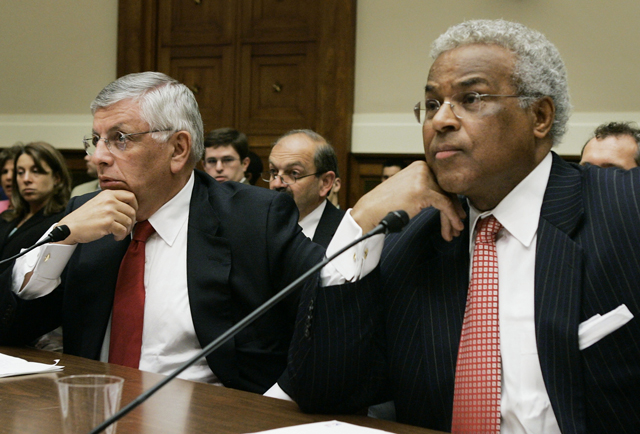
If NBA owners were as unified in these negotiations as the players they employ appeared to be when strolling down the street all wearing the same T-shirt the other day, then maybe they’d have marched back in response with matching ties, briefcases, and cummerbunds or something. They didn’t though, and it seems that’s because maybe they’re not.
For the most part, the cliff-notes version of the central issue at hand in these lockout discussions is the divide between players and owners inspired by twenty-two of those thirty owners claiming to have lost money last season. In response, the owners’ side of the table is asking the players union to slide back over an $800 million annual reduction of total current salary numbers to cover those losses. What these talks have begun to highlight, however, is that it’s not really all that simple. Which is why this lockout will probably last longer than anybody wants it too.
A main issue that is emerging, and causing some owners to create secret handshakes amongst themselves while not including everyone, is the debate over the league’s system of revenue sharing. Small market owners reportedly want more money divied up than simply the luxury tax dollars, which makes up the current totality of revenues shared in the NBA, and big market owners are telling those guys to go pound salt.
Mitch Lawrence broke down the details over the weekend; from the New York Daily News:
“As of now, compared to other pro sports leagues, the NBA lags far behind when it comes to sharing the wealth. Major League Baseball teams share around $450 million annually. In the NFL, teams share about 80% of all revenue from media deals, national sponsorships and merchandise sales, along with 34% of ticket sales after the home team has collected 66% of the gate. That has allowed the Green Bay Packers to continue to thrive in a league with the Giants and Jets and other major-market teams.
But in the NBA, the Lakers and Knicks get to keep all of their revenue from ticket sales and broadcast revenues, giving them an enormous advantage over small-market teams. The Lakers are getting an estimated $3 billion from their new 20-year TV deal with Time Warner Cable that starts next season, but they won’t have to share a dime of that. According to league sources, the Knicks, Lakers and Bulls don’t like the idea of having to contribute more money. But in his league of have and have-nots, Stern sees the need to take care of small-market teams, more than ever before.”
Where this becomes complicated is that the players are essentially arguing that if the revenue sharing system was updated and improved, than less money would be lost in total, and they therefore shouldn’t be asked to take as much of a paycut as being currently requested. Lawrence went on to explain that detail as well:
“Because they’re being asked to take massive paycuts, they’ve argued that they should have a say in how owners share their revenue. They also contend that a better distribution of money can help solve some of the league’s ongoing financial problems, with the league contending it has lost $640 million over the last two seasons. Not surprisingly, owners have rejected the players on both counts, saying getting teams back into the black is going to take more than shifting more money to the small-market clubs.”
I’m not trying to score this lockout, take sides, or anything remotely like that, but at this point the players request with respect to being involved in these revenue sharing talks seems pretty fair to me. If the owners didn’t want the players’ union to have a say in the revenue sharing discussion, why did David Stern allow this to wait until after the players were locked out? Couldn’t revenue sharing have been addressed in a power point presentation during All Star Weekend one of these last few years? Or I guess maybe, did Stern think this was the only way he’d be able to apply enough pressure on a guy like Jerry Buss in order for him to cough up and spread around some of that television cash?
Regardless, this dynamic will be an interesting one to watch moving forward, and locker room doors may not be opened back up again until after it’s all figured out. Even if it doesn’t specifically seem to have all that much to do with the players being locked out in the meantime.
Photo Credit: CBS.com
